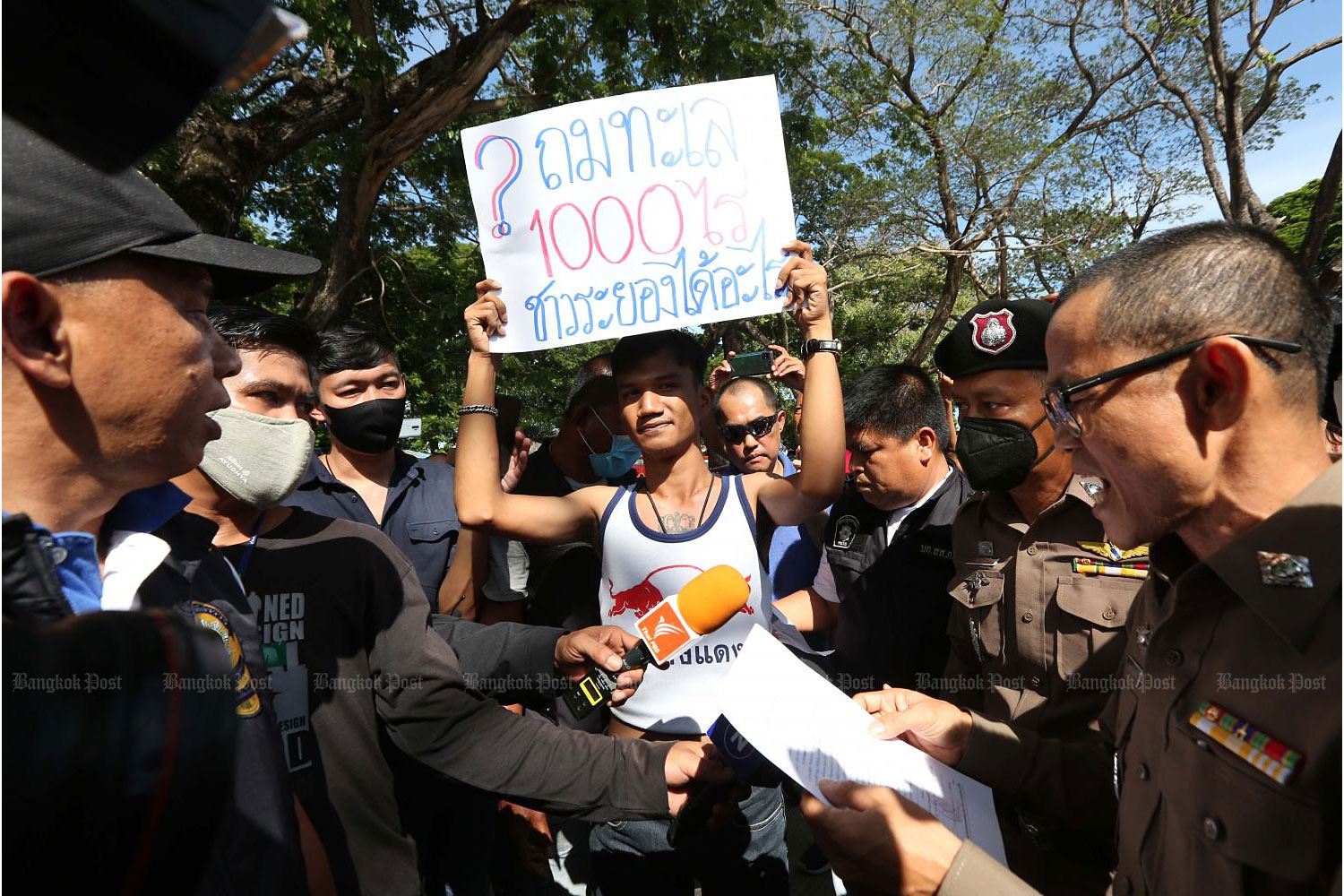
When Gen Prayut Chan-o-cha visited Rayong in mid-July to lend moral support to its residents following a coronavirus scare, the security detail around him was, as usual, tight.
Every precaution was taken to ensure the visit was a pleasant one for the general. So, when two young men carrying placards burst onto the scene, they were met with a horde of intimidating security people.
The young men were forcibly taken away in a police car while demanding to know what charges they faced.
A month later, Gen Prayut returned to Rayong to promote local tourism. This time, a young man was waiting for him alone with a placard demanding to know how Rayong people would benefit from the government's project to reclaim 1,000 rai of land from the sea.
The young man was Panupong Jadnok, known to his friends as Mike.
But the authorities were better prepared this time. They immediately surrounded Mike, and a policeman produced an arrest warrant for his role in a major demonstration at Thammasat University two weeks earlier.
His arrest became instant breaking news. Unfortunately, his message got lost in the melee.
The message he carried with him that day is very relevant but few are aware of it.
The 1,000-rai land reclamation plan is part of the third phase of expansion for the Map Ta Phut industrial estate. On Oct 1 last year, the cabinet approved the Map Ta Phut deep-sea port construction project at a cost of 55.4 billion baht.
What makes this special is that it comes under the massive Eastern Economic Corridor (EEC) project. Some of the benefits of being under the EEC are that it grants exemptions from laws involving city planning, environmental impact assessment studies, and industrial plants, among others.
This makes the EEC practically an extraterritorial legal entity. Its special status is punctuated by its governing board, which is presided over by the prime minister and joined by a deputy PM and ministers from 14 ministries.
Since its inception decades ago, the Map Ta Phut industrial estate has continually heaped environmental misery on the residents of Rayong. At times, air pollution became so toxic that people and schoolchildren had to be evacuated. Chemical leakages, fires and oil spills are recurring nightmares.
Construction projects have caused damage to the sea as well, resulting in a declining marine animal population, an important source of livelihood for a large number of people.
This is not to mention the problems of wastewater and solid and chemical waste that are yet to be effectively managed.
There have also been fears that toxic pollutants have permeated the food chain through fish and other marine animals caught in the sea off Rayong.
The development project has brought economic benefits for big businesses in the industrial estate and increased employment opportunities for the local people around the estate.
But residents elsewhere must contend with declining quality of life. Small-scale fishing folk are the ones particularly hard hit. Environmental damage, meanwhile, has spread far and wide.
The land reclamation projects will exacerbate the situation and heap even more misery on the environment and people.
Literature about land reclamation is full of studies about the environmental impacts from such endeavours. It is always the little people who suffer, and their voices are rarely heard.
Mike has tried to amplify those voices. But while he was immediately whisked away while doing so and the media in general have overlooked it, his message no doubt has lingered in the air.
After all, this is a message of injustice and of inequality. Mike is trying to turn it into a message of hope through his defiance even at the cost of his own liberty.
Because of his activism for the good of society, he is being put in jail. This is the story of social messages turning into political messages. These messages will be amplified at political assemblies and carried by young people to their peers and loved ones at home.
Future demonstrations will attract not only young people but also grassroots people who have been hurt by state projects all over the country, and whose voices have been ignored.
I suspect that even those middle-class people, who during the past six years have stayed on the sideline, will start to feel despair and see the situation for what it is -- unjust and unashamed dictatorial rule.
Supporters of the dictatorship have fewer and fewer arguments for the status quo.
The regime is now engaging in a "legal war" against dissenters, trying to eliminate leading voices by slapping them with dubious charges.
This tactic may have caused some uncertainty among protesters in the beginning. But the unjust use of the law has now caused the opposition to be more determined.
And just like the military-inspired constitution that has created a political dead-end, this suppression campaign will also come to a dead end when no one is afraid anymore.
